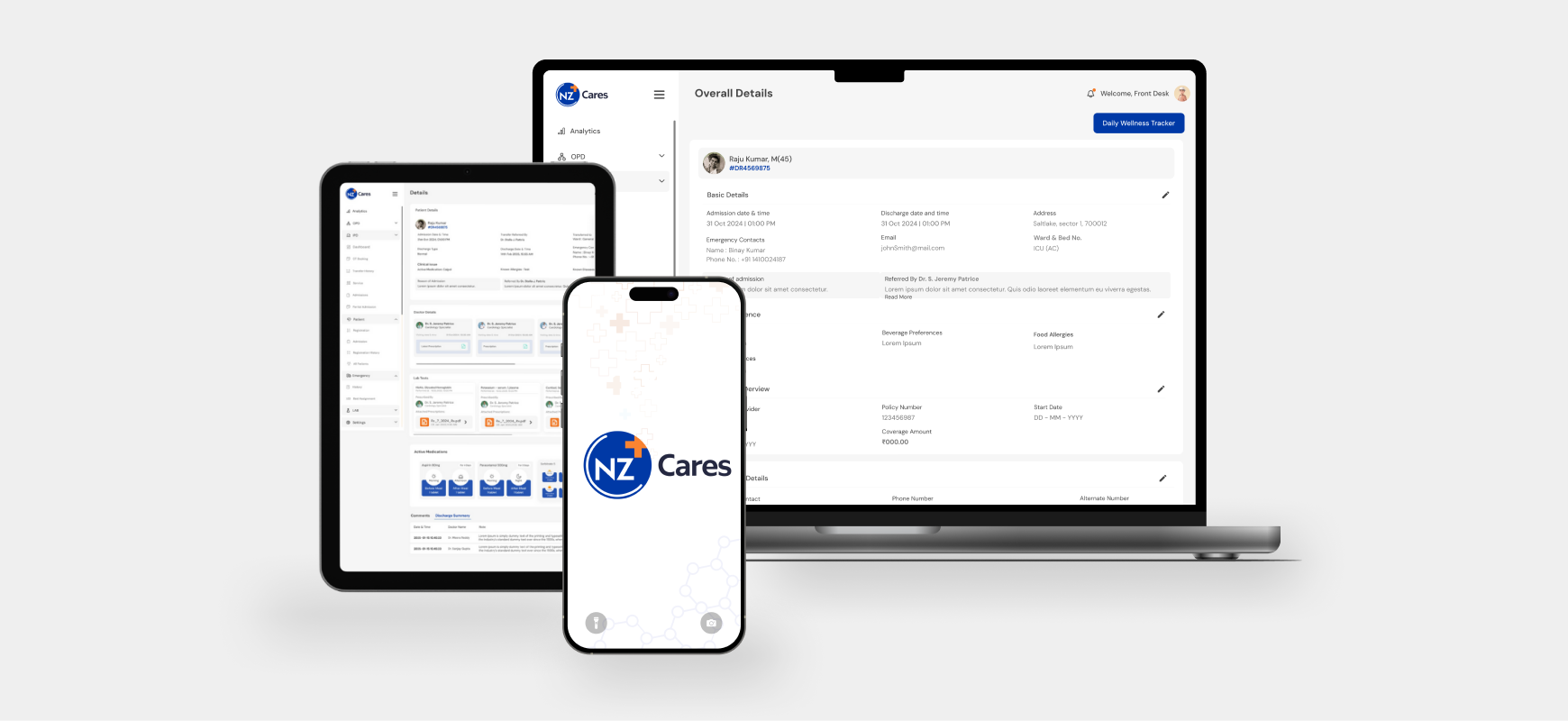In the high-stakes world of healthcare, where every second and every decision counts, managing hospital operations effectively is a formidable challenge.
The risk of losing patient details, effective care, and rising costs always remain high especially if you are running a small facility.
This is where a hospital management system (HMS)- a sophisticated digital solution that eliminates menial tasks, improves patient experience, and provides efficiency in all departments. And here in this article we will try to determine the aspects that influence the cost of hospital management software.

As the healthcare industry is witnessing a seismic shift, with Statista projecting the hospital management software market to exceed $50 billion by 2025. It’s a perfect opportunity to get your facility aligned with a robust HMS solution.
Hospitals and clinics are increasingly investing in custom HMS to improve workflows, elevate patient satisfaction, and deliver better care.
While its benefits are undeniable, the financial investment required to build such a system often sparks interest and concern.
Just what is the cost of hospital management software?
Well, the cost hinges on a variety of factors, from the project’s scope to its technical complexity. Whether it’s a streamlined tool for a small clinic or an all-encompassing hospital information management system for a big medical center, the price can shift dramatically.
In this blog we’ll unravel these costs and break it all down. From design and development to deployment and ongoing support, we’ll pinpoint the key drivers for the cost of hospital management software and explore strategies to optimize your budget.
Key Factors Influencing Cost of Hospital Management Software
The cost of developing/buying hospital management software can start at around $5000- $20,000 for a simple version. If it is a big and customized system made just for one hospital, the cost can go over $500,000. Many things can change the price, and each one is important when planning the budget.
- Scope and Complexity – The size and intricacy of the system set the foundation for costs. A simple HMS with core features like patient registration and billing is far less expensive than one with advanced modules like inventory tracking or telemedicine. More features mean higher development time and cost.
- Technology Stack – The choice of programming languages, databases, and frameworks impacts expenses. Opting for modern, scalable options like cloud-based platforms or AI powered hospital management software and its integration may raise initial costs but reduce long-term maintenance needs.
- Integration with Existing Systems – Connecting the hospital management system to older tools like electronic health records or lab software can be tricky. It often needs special coding and extra checks to make sure everything works well together, which can make the cost go up.
- UI/UX Design – Doctors, patients, and staff need a system that is simple to use. To make this happen, the design must be clear and helpful. Adding things like mobile apps or different language options makes the system better, but it also raises the cost of development.
- Testing and Quality Assurance – A system must be tested for safe use and optimal user experience. Checking how well it runs, responds to commands, and safely utilises information. Quality assurance is an essential step for the project which can add 10-15 percent of the total budget.
- Deployment and Support – Launching the system and training staff are upfront costs, but ongoing maintenance, updates, and technical support add $5,000–$20,000 annually, depending on complexity.
- Customization and Scalability – Tailoring the HMS to your facility’s unique needs or building in scalability for future growth pushes costs higher but ensures long-term value.
Essential Additional Features That May Drive Costs
Beyond core functionalities, certain advanced features can significantly elevate the cost of hospital management software while adding immense value. These include:
- Telemedicine Capabilities
Adding telemedicine software means doctors and patients can talk through video. To make this work, the software needs video tools, safe ways to send information, and quick systems to handle it. This can make the cost go up by around 10 to 15 percent, based on how big and detailed the system is.

- AI-Powered Analytics
Using smart tools that help doctors guess health problems early and manage patient flow takes up about 10 percent of the budget. And proper data analytics in healthcare help management take the right decisions. These tools need strong computer systems to understand and use a lot of data.
- Patient Portals with Advanced Features
When the software lets patients check their health, get tips just for them, or use different languages, it helps them stay more involved. But building these features in the patient management system in your hospital software takes more work and can add about 5 to 10 percent to the total cost.
Choosing Your Development Path: In-House vs. HMS Development Company
Choosing how to build your hospital management software is an important decision for many healthcare providers. How to Choose the Best Hospital Management Software – is yet another question to answer. You can either make it with your own team or ask a group of experts to build it for you. This choice can make a big difference in how well your hospital works.
In-House:
- Offers total project control and customization.
- Aligns perfectly with your facility’s unique needs.
- Saves costs long-term with an existing skilled team.
Hiring a Professional Company:
- Delivers expert knowledge and rapid development due experience in previous HMS development projects.
- Ensures compliance and seamless system integration.
- Provides scalable, high-quality solutions with ongoing support.
NZCares: Your Ultimate Hospital Management Solution
NZCares is an all-in-one hospital management software system that smoothens workflows, reduces costs, and improves care quality. It streamlines processes from patient registration to discharge, built with adaptability and AI-driven innovation to meet tomorrow’s challenges efficiently. NZCares is made for hospitals, doctors, and managers to help them give great care while using fewer resources.
- Enhanced Communication: Doctors and patients can easily see records, set up appointments, and get reminders.
- Secured Data: Patient data is protected and HIPAA-compliant only people with permission can see it.
- Quick Insights: Instant patient data speeds decisions and improves care.
- Cost Efficiency: Optimized resources and accurate billing cut administrative expenses.
- Smart Analytics: Real-time data helps doctors and staff make good decisions.
Conclusion
As hospitals start moving towards digitalization, an AI powered hospital management software for your facility is certainly the right decision.
It helps doctors and staff work faster and take better care of patients. Whether you opt for an in-house build or a professional partner like NZCares, our AI powered hospital management software, the right system enhances efficiency and patient care. Reach out to align your healthcare operation with HMS and open new care possibilities.

